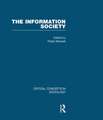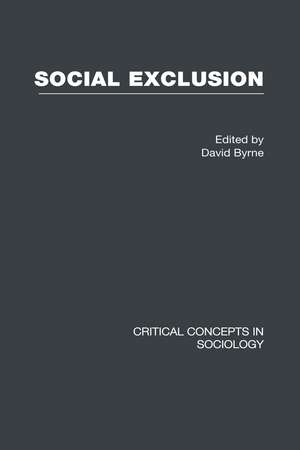Social Exclusion: Critical Concepts in Sociology
Editat de David Byrneen Limba Engleză Hardback – 5 aug 2008
The pervasiveness of the concept is well illustrated by the fact that it is almost impossible to access a policy document from most governments or international agencies dealing with issues of poverty, inequality, under-development, poor educational attainment, poor health, rural development, or urban regeneration, without finding ‘social exclusion’ identified as a problem and methods for including the excluded proposed as solutions. And yet the term is a protean one and has been employed in different ways by academics across a range of disciplines and fields. Moreover, it is translated into practice in different ways which reflect its complex and contested meaning. Researchers and students in all the core social science disciplines and in a range of professional programmes—including those in health, education, social work, housing, planning and training for religious ministry—must contend with the concept, the reality it seeks to describe, and the ways in which the term has influenced both the development and implementation of public policy in the widest sense of that term.
This four-volume collection draws together key texts relevant to this important topic. Volume One reviews the nature and history of the term ‘social exclusion’ and examines ways in which the idea has been used in social research. Volume Two covers income distribution; the nature of class in post-industrial societies and the related dimensions of inequality in relation to gender, ethnicity and age; social exclusion in the changing city; and the general political context of post-democracy with special reference to partnership and participation. Volume Three explores the use of the term ‘social exclusion’ and programmes of social inclusion in specific policy areas including taxation and cash benefits, urban regeneration, health, education, housing, and transport. The final volume in the collection gathers together material to examine programmes specifically directed towards countering social exclusion, with particular reference to community development, and ‘joined-up’ government policy. It also considers radical alternatives to those policies.
Fully indexed and with a comprehensive introduction newly written by the editor, which places the collected material in its historical and intellectual context, Social Exclusion will is an essential reference work, destined to be valued by scholars and students as a vital research resource. It will also be of especial interest to policy-makers and practitioners engaged with ‘social exclusion’ as a social problem.
Din seria Critical Concepts in Sociology
- 34%
 Preț: 3963.82 lei
Preț: 3963.82 lei - 34%
 Preț: 6481.94 lei
Preț: 6481.94 lei - 34%
 Preț: 6200.01 lei
Preț: 6200.01 lei - 34%
 Preț: 6465.04 lei
Preț: 6465.04 lei - 36%
 Preț: 8175.58 lei
Preț: 8175.58 lei - 36%
 Preț: 3950.37 lei
Preț: 3950.37 lei - 34%
 Preț: 4376.48 lei
Preț: 4376.48 lei - 34%
 Preț: 4939.66 lei
Preț: 4939.66 lei - 34%
 Preț: 4524.28 lei
Preț: 4524.28 lei - 34%
 Preț: 4388.31 lei
Preț: 4388.31 lei - 34%
 Preț: 3245.93 lei
Preț: 3245.93 lei - 34%
 Preț: 3812.80 lei
Preț: 3812.80 lei - 34%
 Preț: 3816.10 lei
Preț: 3816.10 lei - 36%
 Preț: 4491.53 lei
Preț: 4491.53 lei - 34%
 Preț: 4235.74 lei
Preț: 4235.74 lei - 34%
 Preț: 6472.62 lei
Preț: 6472.62 lei - 34%
 Preț: 6733.06 lei
Preț: 6733.06 lei - 34%
 Preț: 6732.23 lei
Preț: 6732.23 lei - 34%
 Preț: 1515.73 lei
Preț: 1515.73 lei - 34%
 Preț: 6732.66 lei
Preț: 6732.66 lei - 34%
 Preț: 6184.11 lei
Preț: 6184.11 lei - 34%
 Preț: 6136.37 lei
Preț: 6136.37 lei - 34%
 Preț: 6180.92 lei
Preț: 6180.92 lei - 34%
 Preț: 6136.37 lei
Preț: 6136.37 lei - 34%
 Preț: 4516.00 lei
Preț: 4516.00 lei - 18%
 Preț: 5767.94 lei
Preț: 5767.94 lei - 34%
 Preț: 7313.02 lei
Preț: 7313.02 lei - 34%
 Preț: 3694.86 lei
Preț: 3694.86 lei - 34%
 Preț: 6470.22 lei
Preț: 6470.22 lei - 34%
 Preț: 6187.78 lei
Preț: 6187.78 lei - 34%
 Preț: 5487.80 lei
Preț: 5487.80 lei - 34%
 Preț: 6738.36 lei
Preț: 6738.36 lei - 34%
 Preț: 6177.58 lei
Preț: 6177.58 lei
Preț: 4107.34 lei
Preț vechi: 6191.18 lei
-34% Nou
Puncte Express: 6161
Preț estimativ în valută:
786.04€ • 817.61$ • 648.92£
786.04€ • 817.61$ • 648.92£
Carte tipărită la comandă
Livrare economică 14-28 aprilie
Preluare comenzi: 021 569.72.76
Specificații
ISBN-13: 9780415433389
ISBN-10: 041543338X
Pagini: 1920
Dimensiuni: 156 x 234 x 119 mm
Greutate: 3.71 kg
Ediția:1
Editura: Taylor & Francis
Colecția Routledge
Seria Critical Concepts in Sociology
Locul publicării:Oxford, United Kingdom
ISBN-10: 041543338X
Pagini: 1920
Dimensiuni: 156 x 234 x 119 mm
Greutate: 3.71 kg
Ediția:1
Editura: Taylor & Francis
Colecția Routledge
Seria Critical Concepts in Sociology
Locul publicării:Oxford, United Kingdom
Public țintă
Postgraduate and UndergraduateCuprins
Volume I: Social Exclusion: The History and Use of a Concept Part 1: The Pre-History of the Concept 1.1 The Idea of the Residuum in the Nineteenth and Early Twentieth Centuries 1.2 Citizenship 1.3 ‘Culture of Poverty’ 1.4 Absolute and Relative Poverty 1.5 Marginality 1.6 The Re-emergence of the Idea of an Underclass Part 2: The Development of the idea of Social Exclusion 2.1 Ideas of Social Solidarity in European Socialism and Christian Democracy 2.2 The Emergence of the Concept and its Different Meanings 2.3 Political Definitions of Social Exclusion Part 3: Social Exclusion as an Academic Issue 3.1 Operationalizing Social Exclusion: Measuring Through Quantitative Research 3.2 The Language of Social Exclusion 3.3 Social Exclusion in Qualitative Research 3.4 Dynamism as a Theme: Trajectories Through Life Volume II: Incomes, Politics, the City, and Work: The Broad Context of Contemporary Social Exclusion Part 4: Social Exclusion and Income Distribution: A Review of the Evidence 4.2 Changes in Income Distribution in Post-Soviet Societies 4.3 Changes in Income Distribution in the Large Southern Democracies Part 5: The Politics of Post-Democracy: Exclusion from Power 5.1 Post-Democracy Defined 5.2 Class in Post-Industrial Capitalism 5.3 The Politics of Identity or the Politics of Inequality 5.4 Gender and Social Exclusion: The Particular Situation of the Female Single Parent and the Politics of Child-Rearing 5.5 Social Movements and the Excluded Volume III: The Role of Public Policy: Inclusion or Exclusion? Part 6: Redistribution of Income 6.1 Two Nations: The Inheritance of Poverty and Affluence 6.2 Urban Regeneration 6.3 Social Exclusion and Health Part 7: Education 7.1 Education and Social Mobility: Is Mobility Increasing or Decreasing? The Role of Schooling and Qualifications 7.2 Catching Them Young: Headstart, Educational Priority Areas and Plowden, and Sure Start Part 8: Housing Part 9: Transport Part 10: Culture and Social Exclusion Volume IV: Including the excluded: Policies from the mainstream and the radical alternatives Part 11: Community Development 11.1 The Early Examples 11.2 Urban Programmes in the UK and US—The 1970s and 1980s—Comprehensive Community Programmes, UDCs—The Community Dimension, Single Regeneration Budgets 11.3 Social Capital: Putnam and the Subsequent Debate 11.4 Community Programmes as Part of State Interventions Part 12: Social Inclusion as a European Union Issue Part 13: Capacity Building – UK and South African Policy Examples Part 14: The Radical Alternatives 14.1 The Idea of Empowerment 14.2 The Radical Past 14.3 Radical Religion 14.4 Social Forums: The Twenty-First Century Alternative Part 15: Radical Programmes in Practice 15.1 Montreal: A City Governed by Social Movements 15.2 Puerto Alegro: Participatory Budgeting—Devolving Power to the People 15.3 Radical Regionalism in Europe 15.4 The Limits to Radical Localism
Descriere
Edited by a leading scholar in the field, this new title in the Routledge Major Works series, Critical Concepts in Sociology, is a four-volume collection of canonical and cutting-edge research on the intellectual origins and the development of ‘social exclusion’, a critical concept in the social sciences in general and sociology in particular.
